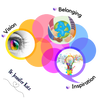|
In my work with universal design for learning and inclusive education, we talk about environments being disabling, rather than people being disabled. A polar bear has a disability in the tropics, and is gifted in the arctic. What this shows us is that environment, and community, is everything.
Now, there are some animals that have a more flexible skill set. Raccoons for instance, can live in many different environments. Their physiological make-up, skills, and talents fit in many different places and communities – not all, of course, but many. Polar bears, on the other hand, are specifically designed to live in a particular environment. Their physiology, skills and talents are uniquely created to flourish in that world, and that world only. Some people are like raccoons. They can fit in, be happy, and be successful in many different environments. Others are more like the polar bear – they flourish in spectacular ways – but only in specific environments and conditions. I have come to realize I am a polar bear. My physiology, skills and talents flourish in particular environments and communities, and parts of me die when I am in other spaces. As I get closer to 50 and gain life experience, I have learned to love being a polar bear. As a youth, however, it is a disability. Youth are all about fitting in. They have to move through environments not of their choosing (school, home, family, etc.), and be able to adapt to varying expectations socially, physically, emotionally, and intellectually. In adolescence, it is much easier to be a raccoon. Many polar bears struggle with depression, low self-concept, anxiety, and more because when fitting in is what counts, and you are a polar bear in the tropics – you can’t see a way to make it work. You can’t see that it is ok to be you. We need to design environments for youth – physically, socially, emotionally, intellectually, and spiritually – that allow polar bears to see their worth, understand the specificity of their gifts and needs, and find their space in the world. And we need to train teachers to recognize the polar bears amongst their students, value them, and help them value themselves.
3 Comments
|
AuthorI am an assistant professor at the University of British Columbia in Inclusive Education, and the developer of the Three Block Model of Universal Design for Learning. Archives
November 2023
Categories
All
Twitter
|
- Home
-
The Three Block Model of UDL
- Services
- Resources
-
Video Series: Inclusive Classrooms
- Series 1 - Equity, Diversity, Justice & Inclusion
- Series 2 - UDL & The Three Block Model
- Series 3 - SEL, Neuroscience, Belonging & Self-Regulation
- Series 4 - Mental Health, Trauma, & Dealing with Challenging Behavior
- Series 5 - Inclusive Instructional Practice
- Series 6 - Starting the Year
- Series 7 - Universally Designed Literacy instruction
- Series 8 - Universally Designed Numeracy Instruction and Assessment
- Series 9 - UDL & INDIGENOUS EDUCATION
- Series 10 - Inclusion in High School
- Video Series: Supporting Struggling Learners
- Video Series: Leadership For Inclusion
- Events
- Publications & Links
- Organization
- Store
- Blog
- Contact Us
- EPSE 317
- For Certified Facilitators Only

 RSS Feed
RSS Feed